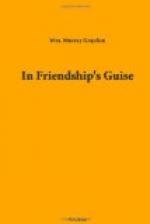At two o’clock on a drizzling, foggy morning a policeman, walking up the Charing Cross Road, paused for a moment to listen to some remote strains of music that came indistinctly from a distance; then he shrugged his shoulders and went on—it was no business of his. The sounds that attracted the policeman’s attention had their source in a cross street to the left—in one of those evil institutions known as a “night club,” which it seems impossible to eradicate from the fast life of West End London.
It was a typical scene; there were many like it that night. The house had two street doors, and behind the inner one, which was fitted with a small grating and kept locked, squatted a vigilant keeper, equally ready to open to a member or deny admittance to any one who had no business there. On the first floor, up the dingy stairs, were two apartments. The outer and smaller room had a bar at one side, presided over by a bright, golden-haired young lady in very conspicuous evening dress, whose powers of repartee afforded much amusement to her customers. These were, many of them, in more or less advanced stages of intoxication, and they comprised sporting men, persons from various unfashionable walks of life, clerks who wanted to soar like eagles, and a few swell young men who had dropped in to be amused. A sprinkling of women must be added.
Both apartments were hung with engravings and French prints and decorated with tawdry curtains, and in the larger of the two dancing was going on. Here the crowd was denser and of the same heterogeneous kind. It was a festival of high jinks—a sway of riotous, unbridled merriment. A performer at the piano, with a bottle of beer within easy reach, rapped out the inspiriting chords of a popular melody. Couples glided over the polished floor, some lightly, some galloping, and all reckless of colliding with the onlookers. There was a touch of the risque in the dancing, suggesting the Moulin Rouge of a Casino de Paris carnival. Occasionally, during a lull, songs were sung by music-hall artistes of past celebrity, who were now glad of the chance to earn a few shillings before an uncritical audience. The atmosphere was charged with the scent of rouge and powder, brandy and stale sherry. Coarse jest and laughter, ringing on the night, mocked at go-to-bed London.
Two young men leaned against the wall of the dancing-room, close to the door, both smoking cigars. They wore evening dress, considerably rumpled, and their attitudes were careless. The elder of the two was Tony Mostyn, a clever but dissipated artist of the decadent school, who steered his life by the rule of indulgence and worked as little as possible.
“It’s rather dull,” he said; “eh, old chap?”
“It gives one a bad taste,” his companion replied. “I don’t see why you brought me here.”
The second speaker was Jack Vernon. He looked bored and weary, but his cheeks were flushed and his eyes sparkled; the women who glanced pertly at him as they swung by inspired him merely with disgust. He had come to the club with Mostyn, after a dozen turns at the Alhambra, followed by a prolonged theater supper. He had drunk more than was good for him during the course of the evening, but the effects had about worn off.




